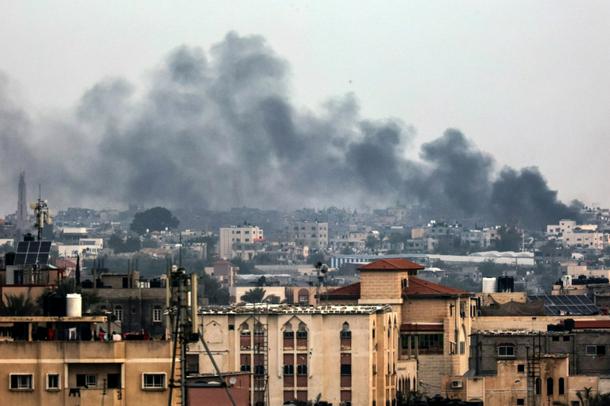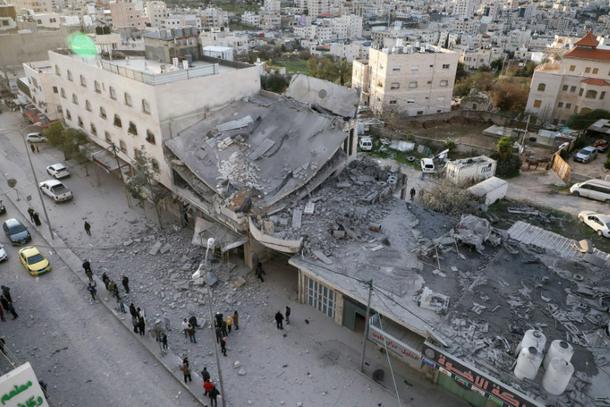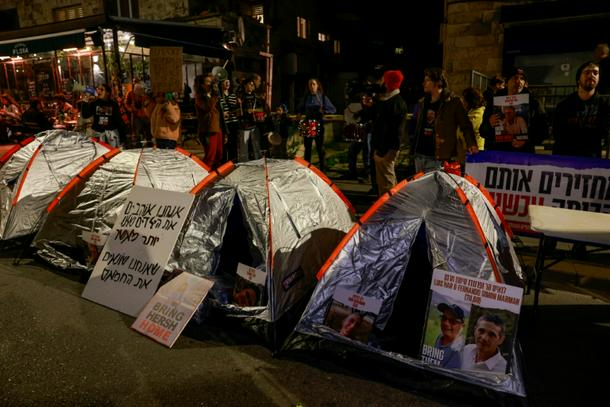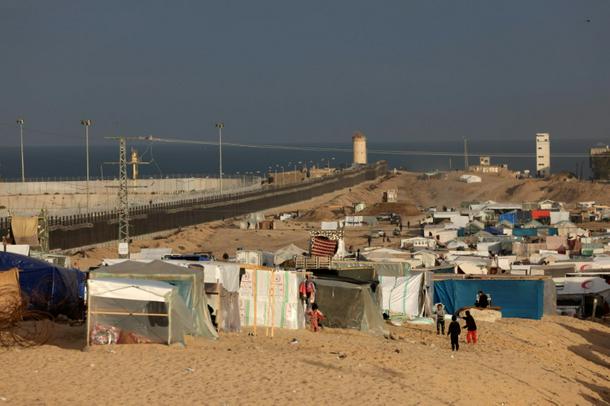
Smoke billows over Khan Yunis in the southern Gaza Strip following Israeli bombardment
Gaza Strip (Palestinian Territories) (AFP) - The Israeli army bombarded Khan Yunis, the latest epicentre of the war in Gaza, on Monday after Prime Minister Benjamin Netanyahu rejected what he said were Hamas conditions for the release of hostages, even amid mounting pressure from their families.
Witnesses reported deadly strikes overnight in Khan Yunis, the largest city in southern Gaza, and fierce fighting between Israeli soldiers and Hamas militants.
The health ministry in Hamas-run Gaza reported on Monday that more than 120 people had been killed in the previous 24 hours.
“Artillery shelling has not stopped since 5:00 am,” said Yunis Abdel Razek, 52, who was sheltering with his family at the city’s Al-Aqsa University.
“We can’t leave the university… it’s dangerous and I fear for the little ones,” he said. “They said the Al-Mawasi area was safe but they lied,” he added, referring to a coastal strip west of Khan Yunis.
Mahdi Antar, 21, meanwhile said he feared forces would “storm” Al-Nasr Hospital where he was sheltering with his family.

Palestinians gather near the rubble of a family home demolished by Israeli forces in Hebron city in the occupied West Bank, where violence has surged alongside the Israel-Hamas war
While fighting is concentrated in the south it has not ended in the north, where Hamas authorities reported shelling in the Gaza City area and witnesses heard explosions.
The strikes came after Hamas on Sunday issued a 16-page report in which they admitted to “some faults” but defended the October 7 attacks that sparked the war.
The attacks resulted in the deaths of about 1,140 people, mostly civilians, according to an AFP tally based on official Israeli figures.
In response, Israel vowed to destroy Hamas, launching a relentless offensive that has killed at least 25,295 people in Gaza, mostly women and children, according to the latest toll issued Monday by Gaza’s health ministry.
- ‘Necessary step’ -
Hamas said in its first public report on the events that triggered the war that if civilians were targeted “it happened accidentally,” and called for an end to “Israeli aggression” in Gaza.
The October 7 attacks were a “necessary step” against Israeli occupation of Palestinian territories and a way to secure the release of Palestinian prisoners, said the report issued in English and Arabic.
US intelligence agencies have estimated that the Israeli campaign has killed “around 20 percent to 30 percent” of Hamas fighters and is still far from its goal of destroying the Islamist movement, the Wall Street Journal reported on Sunday.
In a video statement issued after the Hamas report, Netanyahu said that “in exchange for the release of our hostages, Hamas demands an end to the war, the withdrawal of our forces from Gaza”, the release of Palestinian prisoners and guarantees that Hamas would stay in power.
“If we accept this, our soldiers have fallen in vain,” and security would not be guaranteed, Netanyahu said.
The US coordinator for the Middle East, Brett McGurk, was due to meet top officials in Cairo on Monday, followed by a trip to Qatar, in a bid to secure a new hostage exchange deal, US media said.
- ‘Unacceptable’ -
Netanyahu is under intense pressure to secure the return of the captives and account for security failings surrounding the October 7 attacks.

Protesters stand behind tents during a rally organised by family and supporters of Israeli hostages held in Gaza since the October 7, 2023 attacks by Hamas
Hamas militants seized about 250 hostages and Israel says around 132 remain in besieged Gaza, including the bodies of at least 28 dead hostages, according to an AFP tally based on Israeli data.
Relatives and supporters of the hostages again rallied, on Sunday night near Netanyahu’s Jerusalem residence.
“We are asking our government to listen, to sit down at the negotiating table and decide whether to accept this agreement or any other that would suit Israel,” said Gilad Korenbloom, whose son is a hostage in Gaza.
The 27 foreign ministers of the European Union are expected to hold separate talks with their Israeli and Palestinian counterparts in Brussels on Monday.
Ahead of the talks, EU foreign policy chief Josep Borrell told Israel it couldn’t build peace “only by military means”, describing Netanyahu’s rejection of a two-state solution involving Palestinian sovereignty as “unacceptable”.
- Humanitarian crisis -
UN agencies have warned of famine and disease as Gazans, at least 1.7 million of whom are displaced, struggle with shortages of water, medical care and other essentials during daily bombardment.

A makeshift tent camp houses displaced Palestinians in Rafah in the southern Gaza Strip near the border with Egypt
Abdelrahman Iyad, wounded in Gaza and now being treated aboard the French helicopter carrier Dixmude, docked in Egypt, said he did not have time to leave his house before it was hit.
“I was with my parents, my brother, my sister, my second sister and her husband and their daughter. They all died. I’m the only survivor,” he said.
Rising tensions and violence across the Middle East – involving Iran-backed groups in Lebanon, Iraq, Syria and Yemen – have stoked fears of a wider conflagration.
Sirens were heard overnight in northern Israel near the border with Lebanon, the Israeli military said, where there have been near daily exchanges of fire between Israeli forces and Lebanon’s Iran-backed Hezbollah movement.
Several areas of southern Lebanon were hit overnight, killing one Hezbollah fighter, according to a source in the Hamas-aligned group.